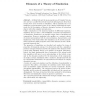Free Online Productivity Tools
i2Speak
i2Symbol
i2OCR
iTex2Img
iWeb2Print
iWeb2Shot
i2Type
iPdf2Split
iPdf2Merge
i2Bopomofo
i2Arabic
i2Style
i2Image
i2PDF
iLatex2Rtf
Sci2ools
128
click to vote
ECAL
1995
Springer
1995
Springer
Elements of a Theory of Simulation
Arti cial Life and the more general area of Complex Systems does not have a uni ed theoretical framework although most theoretical work in these areas is based on simulation. This is primarily due to an insu cient representational power of the classical mathematical frameworks for the description of discrete dynamical systems of interacting objects with often complex internal states. Unlike computation or the numerical analysis of di erential equations, simulation does not have a well established conceptual and mathematical foundation. Simulation is an arguable unique union of modeling and computation. However, simulation also quali es as a separate species of system representation with its own motivations, characteristics, and implications. This work outlines how simulation can be rooted in mathematics and shows which properties some of the elements of such a mathematical framework has. The properties of simulation are described and analyzed in terms of properties of dynamical systems...
Related Content
| Added | 26 Aug 2010 |
| Updated | 26 Aug 2010 |
| Type | Conference |
| Year | 1995 |
| Where | ECAL |
| Authors | Steen Rasmussen, Christopher L. Barrett |
Comments (0)

